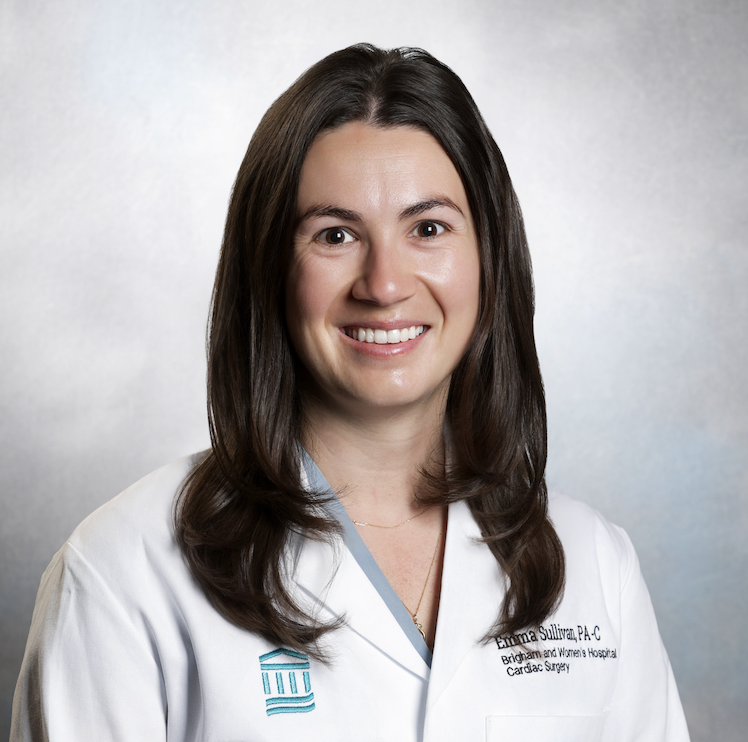The Complexity of Caring for Older Patients
How the West Health Champions Program helped Emma Sullivan, PA, provide personalized care for patients at all stages of life.
For over four years as a cardiac surgery physician assistant at Brigham and Women’s Hospital (BWH), Emma Sullivan has continuously refined her approach to patient care, particularly when it comes to older adults. Providing care for cardiac surgical patients at three stages of their care: in the operating room during surgery, post-operatively in the Cardiac Surgery Intensive Care Unit (ICU), and on the step-down unit preparing patients for discharge, Emma realized that her older patients require different care than what is prescribed for her younger patients.
Like many clinicians, Emma wasn’t trained in geriatric-specific guidelines and, as a result, treated older patients in a similar manner to younger ones. “We were essentially treating 80-year-old patients the same way we treated 40-year-olds, which doesn’t account for their unique needs,” she explains. This posed challenges, particularly in managing the complex, multifaceted needs of older patients undergoing cardiac surgery.
Emma knew her approach to geriatric care was limited, which is why she decided to participate in the West Health Champions Program (previously named the Geriatric Champion Program (GCP)), which aims to educate and train front-line clinicians on best practices and protocols in geriatrics to improve care for older adults at BWH. The program is part of a larger initiative, the West Health Accelerator at Mass General Brigham, a multi-year collaboration between West Health Institute and Brigham and Women’s Hospital, to help speed the transformation of healthcare for older adults across the MGB system.
Emma, who completed the program in November 2024, says the GCP provided valuable insights and tools that significantly changed her approach to caring for older adults. “The program deepened my understanding of aging and emphasized the importance of personalized care,” she says. “I now focus on both the medical and social factors affecting my older patients, and I take a more collaborative, team-based approach to care.” By collaborating with specialists and support services, Emma now ensures her patients receive individualized treatment plans that better address their specific needs.
One of the most impactful resources from the GCP was the session on medications, specifically the Beers Criteria©, a list of medications that should generally be avoided in older adults. “Before the GCP, I did not have the tools to systematically check every medication for its suitability in geriatric patients,” Emma notes. “Now, I use the Beers Criteria as a standard tool for all my older adult patients to ensure that their medications are appropriate for their age and condition.” This simple yet powerful change has made a significant difference in Emma's daily practice, helping her reduce the risk of adverse drug interactions and improve patient outcomes.
However, despite the progress made, challenges persist in the care of older adults. For Emma, managing the polypharmacy common in older cardiac surgery patients is one of the most pressing concerns. “Older adults often have complex medication regimens, which increase the risk of drug interactions and non-adherence,” she explains. Coordinating care across multiple specialists and ensuring effective communication remains a challenge, which can lead to fragmented care.
To overcome these challenges, Emma emphasizes the importance of continuing support for clinicians. “Beyond initial training, we need specialized tools for care coordination and systems for tracking medication management,” she says. “We also need a collaborative care environment where clinicians can regularly consult with social workers, pharmacists, and other specialists to ensure the best outcomes for older patients.” Regular updates on evidence-based practices for aging would further equip providers with the knowledge and resources to deliver high-quality care.
Looking to the future, Emma believes that the West Health Accelerator at Mass General Brigham has the potential to provide the necessary tools, education, and support for clinicians to further improve the care of older adults within the Mass General Brigham system. “By personalizing treatment, leveraging data to manage chronic conditions, and improving care coordination, the West Health Accelerator can create a more proactive, integrated approach to geriatric care,” she says. These changes, she believes, would embed additional measures into the care system, ensuring that providers across the organization have the tools and education needed to deliver the highest standard of care for older patients.
Emma is grateful for what she learned through the West Health Champions program, and she encourages all clinicians to take part in the program, which will be piloted at 9 hospitals across the Mass General Brigham system. In Emma’s words, becoming a geriatric champion is not just about enhancing clinical practice— it's about making a lasting, meaningful impact on the entire healthcare system. “This program allows us to lead change, improve patient care, and grow as clinicians,” she says. “Being part of this initiative is a transformative experience that will shape the future of geriatric care for years to come.”

